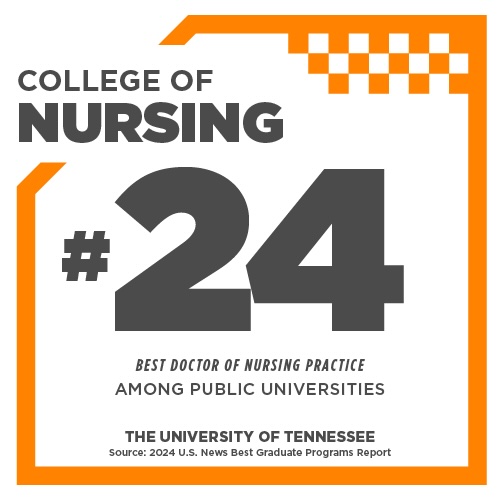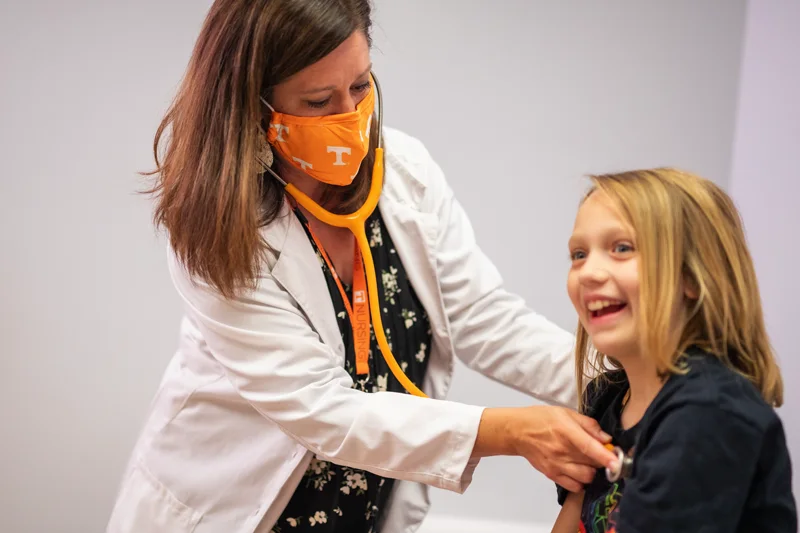Doctor of Nursing Practice (DNP)
In the past, advancing your nursing education to the doctoral level meant a career path in education or research. Today, due to the complexity of healthcare, doctorally prepared nurses are becoming increasingly important in clinical practice. By combining advanced practice nursing skills, appraisal and application of research, and leadership competence, you are empowered to become a more efficient and effective practitioner. DNP clinical experts collaborate with other professionals to make a positive impact in their community and in health care.
Apply Now

Concentrations

BSN-DNP Family Nurse Practitioner Concentration
The Family Nurse Practitioner (FNP) concentration prepares graduates for advanced nursing practice in delivering primary care to individuals across the lifespan… LEARN MORE

BSN-DNP Psychiatric Mental Health Nurse Practitioner Concentration
The Psychiatric Mental Health Nurse Practitioner concentration prepares students to become advanced practice nurses in the psychiatric mental health field… LEARN MORE

Pediatric Primary/Acute Care Dual Nurse Practitioner
The pediatric nurse practitioner (PNP) program prepares graduates to practice as advanced practice registered nurses with specialized education… LEARN MORE

Post-master’s DNP
The Post-master’s DNP Program is a hybrid online curriculum with on-campus visits twice per semester throughout the students’ program of study… LEARN MORE

BSN-DNP Nurse Anesthesia Concentration
The nurse anesthesia concentration will permit the graduate an opportunity to take his or her place among the ranks of the highly respected CRNAs… LEARN MORE

Primary Care Pediatric Nurse Practitioner
The Primary Care Pediatric Nurse Practitioner (PNP) program prepares graduates to practice as advanced practice registered nurses with specialized education… LEARN MORE
ADMISSIONS
The DNP program at the College of Nursing uses a holistic admissions process in which the applicant’s essay and personal interview are given priority. These items are used to assess the applicant’s previous educational and work-related accomplishments and their readiness for the DNP program. Career goals and areas of focus of the applicant are considered.
Key Application Deadlines
December 1: Early-Decision application deadline for applicants; Students will be notified of a decision within three weeks after the application deadline
January 7: Second application deadline for applicants
February 15: Final application deadline for applicants
Eligibility
- Hold a bachelor’s degree in nursing from a program accredited by the National League for Nursing Accrediting Commission or the Collegiate Commission on Nursing Education.
- Have a minimum cumulative graduate grade point average of 3.00 on a 4.00 scale for previous college work.
- Hold an unencumbered Registered Nurse license in the state of residency.
- Have a total score of 80 on the internet-based TOEFL or a 6.5 overall band score on the IELTS if native language is not English.
Application Requirements
All prospective College of Nursing students must apply online through UT Graduate Admissions and pay the application fee. Application materials must be submitted directly to Graduate Admissions prior to the application deadline. A completed application will consist of
- Official transcripts from all Graduate programs and courses attended. Transcripts must be submitted directly to Graduate Admissions at prior to the application deadline
- Essay addressing College of Nursing essay prompts.
- Resume/CV
- Recommendations from three college level instructors and/or nurses and administrators who have supervised the applicant’s professional work. If the applicant has completed an academic program in the last two years, one rating form must be completed by a faculty member from that program.
- Nursing License
- Interview with the College of Nursing DNP admissions committee, as specified by the program.
- GRE Scores, for Nurse Anesthesia only
- TOEFL scores, if required
Application Process
Upon submission of an application, the University’s Graduate Admissions office determines if the application meets the University’s minimum admission requirements. If deemed minimally admissible, the application will then be reviewed by the College of Nursing. Graduate Admissions processes applications in the order of submission; due to the application queue, prospective students are strongly encouraged to submit applications well in advance of the College of Nursing’s deadline. Applications will be reviewed upon submission.
Applicants are typically notified of their admission decision five to six weeks after the application deadline. Notifications are sent by email.
It is the applicant’s responsibility to ensure their application is complete. Applicants are strongly encouraged to check first with Graduate Admissions to see if all transcripts and materials have been submitted properly. Applicants can check the status of their application via the UT Graduate School Status Checker.
Questions
If you have any questions, contact the College of Nursing Graduate Programs at congrad@utk.edu.
PROGRAM FEATURES
- Immersion in an area of professional practice
- Knowledge and skill acquisition for application
- Appraisal and application of evidence to advance practice
- Leadership in health care systems
- Curriculum focused in evidence-based practice, leadership, population health policy, and quality improvement project planning
- Blended curriculum delivery* combining face-to-face instruction and online learning, which has proven to be effective in terms of learning outcomes and student satisfaction
- Individually tailored scholarly project in your area of practice and interest
- Scholarly project funding available by application
- Colloquium, a time for DNP and PhD students and faculty to share and discuss their topic of interest
- A faculty that includes expert clinicians, educators, and nurse executives
- Faculty commitment to guiding students through the project development and implementation process
- Full accreditation by CCNE
*Our graduate programs are offered via a blended distance education model, with most coursework completed online and periodic on-site visits to the campus in Knoxville. Class sessions are synchronous and will also occur throughout the semester. These mandatory online course meetings will be scheduled prior to the beginning of the term so students may arrange their schedules accordingly.
REQUIRED ON-SITE VISITS
Doctoral On-sites: The core courses in the DNP program are offered in a flexible blended format. The blended format consists of two required on-site, face-to-face visits per term complemented with live online group and collaborative discussions and activities; structured asynchronous individual, group, and self-directed work; and individual guidance, mentoring, and advising.
Clinical On-sites: Once students are in the clinical concentration portion of their program of study, they are no longer required to attend the doctoral on-site dates; However, the FNP, PNP-PC, PNP-AC, and PMHNP concentrations at the College of Nursing have mandatory clinical on-site sessions consisting of full-day experiences such as clinical labs or simulations.
On-site requirements provide opportunities for networking with peers, formative learning, and summative assessments of advanced clinical skills within the College of Nursing’s high-fidelity simulation center. These days cannot be missed, made up, or substituted with other types of assignments.
FNP concentration: Each semester will have one to two on-site sessions.
PNP-PC/PNP-AC concentrations: Each semester will have one to two on-site sessions.
PMHNP concentration: Each semester will have one to two on-site sessions.
CATALOG
More Information about the program, admission requirements, and individual course descriptions can be found in the Graduate Catalog.
MORE INFORMATION
ou can read more about our programs in our Graduate Handbook. For any questions, please contact us below.